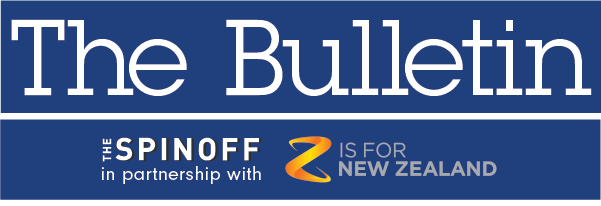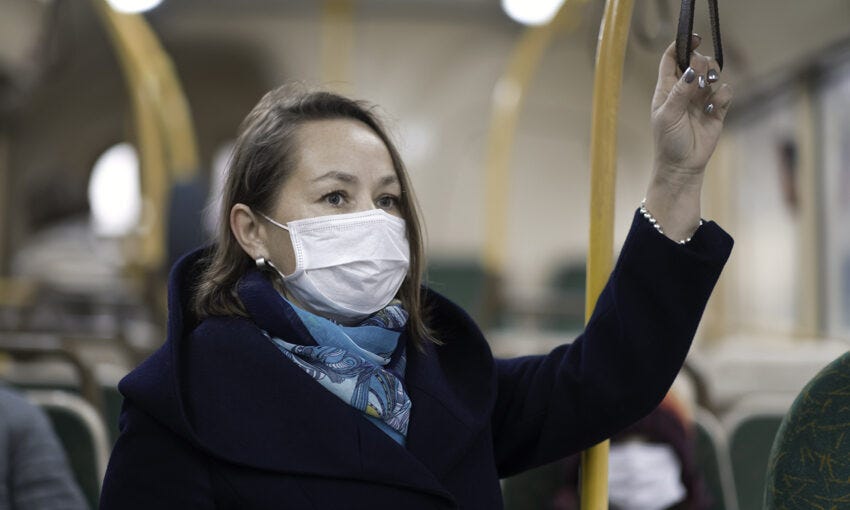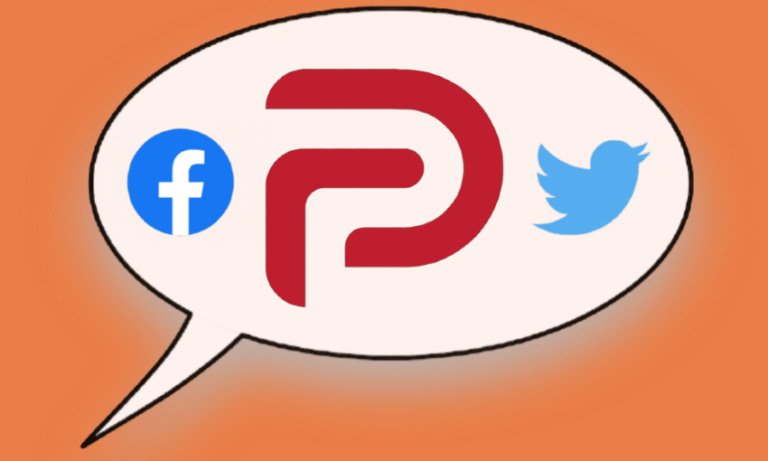Masks on, stay home if you can – Auckland's new community case
A range of rapid responses have been made to the new case of unknown origin
Good morning and welcome to The Bulletin for Friday 13 November, by Alex Braae for The Spinoff. Presented in partnership with Z Energy.
In today’s edition: Rapid response taken to new community Covid case, calls for urgency on sick leave increase, and the situation internationally.
Image: Masks haven’t been made compulsory on public transport, but come on, do it anyway. (Getty Images)
A community case of Covid-19 is causing alarm, given at this stage there are no established links to the border or a managed isolation facility. The government has swung into a flurry of action as a result, with a range of warnings and recommendations being made. Aucklanders are being told to minimise all movements in and out of the CBD, work from home if possible, wear a mask on public transport and to sign in everywhere they go with the Covid app.
The case is a woman in her 20s, who went to work while symptomatic. As our live updates reports, she became symptomatic on November 9, was tested on November 10 and was asked to isolate but went to work on November 11. She called in sick to work after receiving advice to isolate, but after advice from her manager, went to work wearing a mask. Covid-19 response minister Chris Hipkins said it was "disappointing" that the manager had advised them to come into work. Auckland mayor Phil Goff went further, saying it was "frankly unbelievable." There's a large number of locations of interest – please check the list and follow the advice if you were in any of them at the listed time. Pop up testing locations can be found here.
The race is now on to find the source of the case. One speculated source, around a recent fire alarm at a managed isolation facility next to where the woman lived, has been rejected. Cleaning and mass testing is now taking place at locations of interest to see if that was where it was caught, or it has spread further from there. Residents at the apartment block that the woman lived in were made aware of the case by media, reports Radio NZ.
Will Auckland's alert level shift up? A decision on that will be announced at some stage today, with nothing being ruled in or out. Covid-19 modeller Shaun Hendy told Checkpoint last night "if tomorrow there aren't links established to an MIQ facility, or to a worker in that facility, then I think they need to look at an alert level change." The key question will be whether it becomes clear that any potential outbreak has been contained, or whether there has been undetected spread.
So what should we do now? Apart from asking Auckland CBD workers to stay home if possible, the government has not mandated compulsory mask-wearing on public transport or use of the Covid app. But seriously, just do it anyway. If you've got symptoms, isolate yourself except to get a test, and practice social distancing. Nobody wants a locked down summer, and it doesn't have to happen if everyone does their bit.
Meanwhile, the detail around the case coming in to work after talking to their manager is sparking calls for urgency around increasing sick leave. Stuff reports the unions are calling for an election promise – 10 days sick leave rather than the existing five – to be put in place immediately. But the story also goes into the idea that just increasing sick leave provisions wouldn't necessarily be enough, because in many jobs pressure is put on employees to not use their entitlements. As First Union organiser Ben Peterson put it, "retail workers are telling us that the culture relies on guilt – workers are made to feel responsible for inadequate staffing levels and are often pressured to cover for each other when the real responsibility lies with the employer to provide safe staffing levels."
Even if we do have to raise alert level restrictions again, New Zealand is overwhelmingly lucky by international standards. AP News reports the US is setting grim new records right now for confirmed cases and in some states hospitalisations, and the daily death rate is on the rise again too. And in Britain, George Fenwick has written a beautiful piece about being back in lockdown and without a job in London, as a long hard winter closes in.
Without waiting for the Reserve Bank, ASB has announced they will be reintroducing loan to value ratios on property investor lending immediately, reports Interest. If you want a refresher on what that is, read yesterday's Bulletin. ASB boss Victoria Shortt said that with the property market reaching ridiculous new heights, "if this increase in investor demand continues it could lead the country down a potentially unsustainable path." Meanwhile, Green co-leader James Shaw has heavily criticised the government for not turning to a capital gains tax as a mechanism to cool the market, reports Stuff.
High earners are being warned they could be hit with tax avoidance if they restructure their finances ahead of the new top tax rate coming in, reports the NZ Herald's Tamsyn Parker. The new threshold will take effect at income earned over $180,000, at a rate of 39%. However, the trust rate is staying the same. A tax expert quoted in the story suggested IRD will take a dim view of restructuring that seems to be purely for tax reasons.
There's something in the water, as it were. In Dunedin, the ODT reports up to 600 litres of diesel has been spilled into Otago harbour. In Wellington, a 'fatberg' has resulted in 20,000 litres of sewage getting into the harbour, reports Stuff. And in Auckland, there are toxic sea slugs washing up on the beaches that could kill your dog if eaten, reports Josie Adams. Surf's up!
An interesting story for Nelson right now, with 10,000 people signing a petition against new housing in the Maitai/Kākā Valley. The Nelson Mail reports the issue has been deeply controversial for many, because of the natural beauty and biodiversity of the area. The city (like everywhere else in the country) is pretty hard up for housing right now, and some signatories say that with pretty much every other valley being developed, this one should be protected.
We've published an excellent new article about the power of vaccination, in partnership with Te Hiranga Hauora. Written by Dr Siouxsie Wiles, it goes into the history of infectious diseases, and how without vaccines they routinely sickened or killed people. We now take it for granted that kids today won't suffer from polio, for example – but until about 70 years ago, there were hundreds of cases every year, many with terrible outcomes.
Got some feedback about The Bulletin, or anything in the news?
Drop us a line at thebulletin@thespinoff.co.nz
Right now on The Spinoff: Janaye Henry writes about a year of full immersion in te reo Māori, and what could and couldn't be learned in that time. Maia Hall writes about the progressive drug legislation approved in referendums in the US, and why it didn't happen here. Michael Andrew reports on debates in Auckland local government about whether to use glyphosate as a weed-killer, or other more expensive but less toxic methods. Stewart Sowman-Lund writes about Parler, the social media platform alt-right types are flocking to. Ben Fahy reports on how the internet of things is creating tiny efficiencies, and changing the way businesses work. Duncan Greive reviews a new book that charts the first decade of Instagram's rise. Alice Webb-Liddall writes about a Silo Theatre show encouraging thoughtful discussion of depression and suicide.
And we've got a brand new Frame documentary to share: It charts the campaign of Chlöe Swarbrick for Auckland Central, a long-shot bid for a seat that turned out better than her campaign team could have hoped for.
For a feature today, an old interview with a recently departed musician. Writing on Witchdoctor, Gary Steel has republished an interview with Midnight Oil bass player Bones Hillman from 1987, just after he had joined the band following stints with The Swingers and the Suburban Reptiles. The piece gives a really good glimpse of what the touring band scene was like at the time. Here's an excerpt:
Before his appointment to the Oil mob, Hillman was a hired hand around the city. Rather than dedicate himself to just one band, he spread his talent around. “The main thing was to support myself as a player,” he says. There’s no way you can give one hundred percent when you’ve been working an eight hour day.”
I chatted with Hillman, subsequent to the New Zealand Music Industry Awards, and he was buzzing with excitement about his Oils appointment. Sitting in the Sheraton Hotel foyer at 1am attempting an interview after a long night isn’t an easy task.
Hillman was sharing a table with Neil Finn, with whom he also shares a house in Melbourne. “We just all came across on the same plane… free nosh at the Sheraton without wearing a bow-tie!”
The wheels are falling off the Australian Baseball League, which was starting to build some promising momentum. The Auckland Tuatara announced last night that they won't be able to take part, and Geelong-Korea have also pulled out, due to complications around Covid-19 reports the NZ Herald. It's probably worth noting that the finances of this competition are comparatively tighter compared to other trans-Tasman tournaments. Here's hoping it won't be a franchise-ending event for the Tuatara – I went to one of their games at the start of the year and it was a really great event.
That's it for The Bulletin. If you want to support the work we do at The Spinoff, please check out our membership programme







